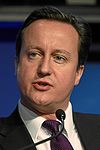- Next United Kingdom general election
-
United Kingdom general election, 2015 
2010 ←
members7 May 2015 → 2020 All 650 seats[1] to the House of Commons
326 seats needed for a majority.[1]


Leader David Cameron Ed Miliband Nick Clegg Party Conservative Labour Liberal Democrat Leader since 6 December 2005 25 September 2010 18 December 2007 Leader's seat Witney Doncaster North Sheffield Hallam Last election 306 seats, 36.1% 258 seats, 29% 57 seats, 23% Current seats 306 258 57 Seats needed  19[1]
19[1] 68[1]
68[1] 269[1]
269[1]2001 election • MPs 2005 election • MPs 2010 election • MPs The next United Kingdom general election will be the election to the 56th Parliament of the United Kingdom. The election will be held on 7 May 2015 (save for a collapse of government or a two-thirds majority of MPs voting for an early election) under the terms of the Fixed-term Parliaments Act 2011.[2]
The general election will see voting take place in all parliamentary constituencies of the United Kingdom, in order to elect Members of Parliament (MPs) to seats in the House of Commons, the lower house of the Parliament.
This will be the 55th general election for the United Kingdom since 1801 (earlier elections took place for parliaments in Great Britain and Ireland), though the resultant Parliament will be the 56th, as the first Parliament came about after the co-option of members from the Parliament of Great Britain and the Parliament of Ireland.
Contents
Date of the election
Previous law
An election was usually called following the dissolution of the Parliament of the United Kingdom. The power to dissolve Parliament was a Royal Prerogative, exercised by the Queen on the advice of the Prime Minister. It was extremely unusual for the Sovereign to refuse a request for dissolution; the guidelines under which this might occur are known as the Lascelles Principles after the King's Private Secretary who set them out. An incumbent Prime Minister could choose to call a general election at a time when they enjoyed a temporary tactical advantage (the Conservatives' decisive win in the 1983 election was attributed in part to a boost in the party's fortunes following victory in the Falklands War).[3]
Under the provisions of the Septennial Act 1715, as amended by the Parliament Act 1911, the election had to be held on or before Thursday 11 June 2015, barring exceptional circumstances. Since the enactment of the 1715 act, Parliament has never been allowed to expire.
The previous general election, held on 6 May 2010, elected MPs to the 55th Parliament which began on 18 May 2010; as such, Parliament would expire at the end of 17 May 2015.[4][5] Since the last day that a proclamation summoning a new Parliament could be issued is this day of expiration, election timetables dictate that the latest possible date for the election was 11 June 2015.[5]
It is possible for constituencies to be forced to delay their date of polling. In each of the two preceding general elections, there has been a constituency forced to delay their vote, due to the death of a candidate.[6]
Fixed-term Parliaments Act
See also: Fixed-term Parliaments Act 2011Prior to the 2010 general election, both the Labour Party and the Liberal Democrats pledged to introduce fixed-term elections.[7] As part of the Conservative – Liberal Democrat Coalition Agreement, the Cameron Ministry agreed to legislate for fixed-term Parliaments, with the date of the next general election being 7 May 2015.[8] This would have coincided with elections for the Scottish Parliament and National Assembly for Wales, which are held on a four-year, fixed-term basis. In response to cross-party criticism of this, Nick Clegg offered each devolved body the right to vary their length of tenure by a year in either direction. Therefore, the next elections to the Scottish Parliament and National Assembly for Wales will take place in 2016.
To make the fixed-term legislation effective, a prime minister no longer has the power to advise the Queen to call an early election as a political tactic. The bill originally only permitted early dissolution if Parliament voted for one by a supermajority of 55%. A government could still lose a vote of no confidence and be replaced on a normal majority of 50% plus one. Later, the Government chose to increase the proposed supermajority to two-thirds, as is used by the Scottish Parliament and Welsh Assembly. When doing so, Deputy Prime Minister Nick Clegg clarified that Parliament would be dissolved if no new government could be formed within 14 days of a no-confidence vote.[9]
MPs standing down
Conservative
- James Arbuthnot (North East Hampshire), announced 6 June 2011[10]
Labour
- John Denham (Southampton Itchen), announced 7 October 2011[11]
- Glenda Jackson (Hampstead and Kilburn), announced 23 June 2011[12]
- Dawn Primarolo (Bristol South), announced 10 November 2011[13]
Electoral system
See also: Parliamentary Voting System and Constituencies Act 2011The Parliamentary Voting System and Constituencies Act 2011 will reduce the number of seats in the Commons from the current 650 to 600. It also instructs the Boundary Commissions to undertake the Sixth Periodic Review of Westminster constituencies before 2014, which involves a notable redistribution of seats between the four parts of the UK and the near-equalisation of constituency sizes by electorate.
In addition, the Act mandated a referendum in 2011 on changing from current first-past-the-post system to the Alternative Vote system for elections to the Commons. The Conservative – Liberal Democrat Coalition Agreement committed the coalition government to such a referendum.[14] The referendum was held in May 2011 and resulted in the retention of the existing First Past The Post system.
Before the previous general election the Liberal Democrats had pledged to change the voting system, and the Labour Party had pledged to have a referendum about changing the voting system.[7] The Conservatives had pledged to keep first past the post, but to cut the number of constituencies by 10%. Liberal Democrat plans were to reduce the number of MPs to 500 elected using a proportional system.
Political parties
Main article: List of political parties in the United KingdomAs of 17 September 2010[update], the Electoral Commission's Register of Political Parties includes 392 different political parties registered in Great Britain,[15] and 43 in Northern Ireland.[16] In addition, candidates who do not belong to a registered party can use "independent" or no label at all.
Target seats
In accordance with the Parliamentary Voting System and Constituencies Act 2011, the Boundary Commissions are undertaking a full revision of constituency boundaries with an instruction to reduce the number of constituencies to 600 and to recommend constituencies which are no more than 5% above or below the standard size. The Boundary Commissions are required to produce their reports by 1 October 2013.
Should the election take place before these new boundaries are agreed, it will use the same boundaries as the previous election (2010). Listed below are some of the top target seats of each of the three main parties:
* By-election held here in 2011 makes this a more difficult seat to gain in reality
SNP targets Swing Required Plaid Cymru targets Swing Required Green Party targets Swing Required 1 Ochil & Perthshire South (LAB) 5.14% Ynys Mon (LAB) 3.55% Norwich South (LD) 7.20% 2 Argyll & Bute (LD) 6.34% Government formation
Each parliamentary constituency of the United Kingdom elects one MP to the House of Commons using the 'first past the post' system. If one party were to obtain a majority of seats, then that party would be entitled to form the Government. If the election results in no single party having a majority, then there is a hung parliament. In this case, the options for forming the Government are usually either a coalition government or a minority government.
Opinion Polling
Notes
- ^ a b c d e Figures given here presume no change in the size of the Commons. However, the Parliamentary Voting System and Constituencies Act 2011 will reduce the number of seats to 600, and thus the number of seats needed for a majority to 301.
- ^ "At-a-glance: Coalition policies". BBC News. 13 May 2010. http://news.bbc.co.uk/1/hi/uk_politics/election_2010/8677088.stm.
- ^ David Butler and Dennis Kavanagh, "The British General Election of 1983", Macmillan, 1984, p. 293-4.
- ^ Technically, Parliament could vote to extend the lifetime of the current term beyond five years. This cannot be done by the House of Commons alone; it must be approved by the House of Lords (the Parliament Acts 1911 and 1949 may not be utilised in this case) and by the Queen-in-Parliament. Since 1911, extension of a Parliament's maximum term has only occurred during the First and Second World Wars, by annual acts extending the maximum term starting in 1915 and 1940, respectively.
- ^ a b "Research Paper 07/31: Election Timetables". House of Commons Library. http://www.parliament.uk/commons/lib/research/rp2007/rp07-031.pdf.
- ^ "Thirsk and Malton candidate death delays poll date". BBC News. 22 April 2010. http://news.bbc.co.uk/1/hi/uk_politics/election_2010/england/8638371.stm.
- ^ a b "Where They Stand: Guide to party election policies". BBC News. 26 March 2010. http://news.bbc.co.uk/1/hi/uk_politics/election_2010/8515961.stm#subject=constitution.
- ^ "Full text of the Conservative – Liberal Democrat coalition deal". The Guardian (London). 12 May 2010. http://www.guardian.co.uk/politics/2010/may/12/lib-dem-tory-deal-coalition. Retrieved 12 May 2010.
- ^ House of Commons Debate 5 July 2010 c 23.
- ^ http://conservativehome.blogs.com/goldlist/2011/06/james-arbuthnot-becomes-the-first-mp-to-announce-his-retirement-at-the-next-general-election.html
- ^ "Denham to stand down as MP". Southern Daily Echo. 7 October 2011. http://www.dailyecho.co.uk/news/9283002.Denham_to_stand_down_as_MP/.
- ^ Graham, Georgia (23 June 2011). "Glenda Jackson won’t stand in next election". Ham & High. http://www.hamhigh.co.uk/news/glenda_jackson_won_t_stand_in_next_election_1_931028.
- ^ "Bristol South MP Dawn Primarolo to stand down". BBC News online. 11 November 2011. http://www.bbc.co.uk/news/uk-england-bristol-15690556.
- ^ BBC News: Full text: Conservative-LibDem deal
- ^ "Party Finance - the Electroal Commission". Electoral Commission. 16 September 2010. http://registers.electoralcommission.org.uk/regulatory-issues/regpoliticalparties.cfm?ec=%7Bts%20%272010%2D09%2D17%2012%3A55%3A54%27%7D. Retrieved 17 September 2010.
- ^ "Register of political parties (Northern Ireland)". Electoral Commission. 16 September 2010. http://registers.electoralcommission.org.uk/regulatory-issues/regpoliticalparties.cfm?ec=%7Bts%20%272010%2D09%2D17%2012%3A59%3A39%27%7D. Retrieved 16 September 2010.
External links
Boundary Commissions
- Boundary Commission for England
- Boundary Commission for Scotland
- Boundary Commission for Wales
- Comisiwn Ffiniau i Gymru (Welsh)
 Elections and referendums in the United Kingdom
Elections and referendums in the United KingdomGeneral elections 1801 co-option · 1802 · 1806 · 1807 · 1812 · 1818 · 1820 · 1826 · 1830 · 1831 · 1832 · 1835 · 1837 · 1841 · 1847 · 1852 · 1857 · 1859 · 1865 · 1868 · 1874 · 1880 · 1885 · 1886 · 1892 · 1895 · 1900 · 1906 · 1910 (Jan) · 1910 (Dec) · 1918 · 1922 · 1923 · 1924 · 1929 · 1931 · 1935 · 1945 · 1950 · 1951 · 1955 · 1959 · 1964 · 1966 · 1970 · 1974 (Feb) · 1974 (Oct) · 1979 · 1983 · 1987 · 1992 · 1997 · 2001 · 2005 · 2010 · NextLocal elections European elections Referendums 1975 · 2011Elections and referendums in Great Britain • Ireland • Northern Ireland • Scotland • WalesCategories:- Future elections in the United Kingdom
- General elections in the United Kingdom
Wikimedia Foundation. 2010.

